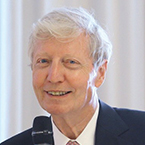
For his seminal, Nobel Prize winning discovery of the receptors of innate immunity and their roles in detecting microorganisms and subsequently activating signaling pathways that control innate immune responses.
For his landmark discovery of the Toll pathway and its contribution to the activation of innate immunity. This work provided crucial insights into the ability of Toll receptors to detect microorganisms and subsequently activate innate immune responses, a cellular mechanism now considered a fundamental concept in immunology. In his studies involving the insect immune system, Dr. Hoffmann utilized mutated Drosophila melanogaster models to identify key factors involved in fungal infections. These studies resulted in the discovery of a number of different inducible antimicrobial peptides including drosomycin and metchnikowin, produced by the fat body in fruit flies.
Importantly, his research group demonstrated the critical role that the Toll signaling pathway plays, specifically via transmembrane receptor Toll and the ligand spätzle, in the expression of the antimicrobial peptide drosomycin during fungal infections. In addition, Dr. Hoffmann demonstrated that fruit flies with mutations in the Toll signaling pathway were more susceptible to such infections. This work established that the Toll pathway not only plays a critical role during embryonic development, but also functions as a sensor for infections and a mediator of immune response. These revolutionary findings would lead to the subsequent discovery that Toll-like receptors signal via NF-kB family members in mammals, leading to the expression of adaptive immune proteins including cytokines and major histocompatibility complex (MHC) proteins. Dr. Hoffmann is also celebrated for characterizing a second immune signaling pathway, the Imd pathway, which shares similarities to the mammalian tumor necrosis factor receptor superfamily (TNFRSF) of cytokines. The implications of Dr. Hoffmann’s work are significant and wide-ranging, as they continue to influence a broader understanding of the immune system and have led to critical advances in treatments for microbial infections and a spectrum of diseases including cancer.
Career Highlights
2012 Elected Immortal, French Academy
2012 Officer, Legion of Honor (France)
2011 Gold Medal, French National Centre for Scientific Research
2011 Gairdner International Award, Gairdner Foundation
2011 Nobel Prize in Physiology or Medicine
2011 Shaw Prize in Life Science and Medicine, The Shaw Prize Foundation, Kowloon, Hong Kong
2010 Lewis S. Rosenstiel Award for Distinguished Work in Basic Medical Science
2008 Elected Foreign Associate, National Academy of Sciences, Washington, D.C.
2007 Balzan Prize for Innate Immunity, International Balzan Prize Foundation
2007-2008 Elected President, French Academy of Sciences
2004 Robert Koch Prize for Excellence in Scientific Achievement
2003 Elected Foreign Member (hon), American Academy of Arts and Sciences
1988 Elected Foreign Member, Academy of Sciences Leopoldina, Halle, Germany